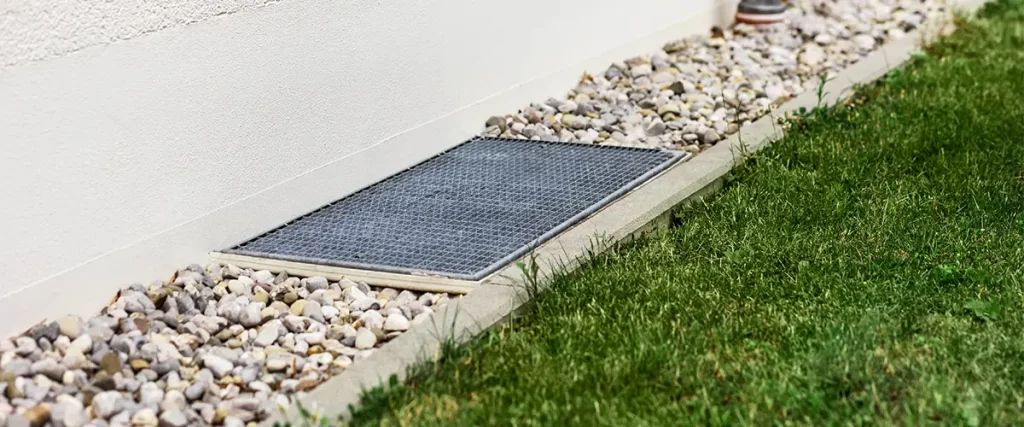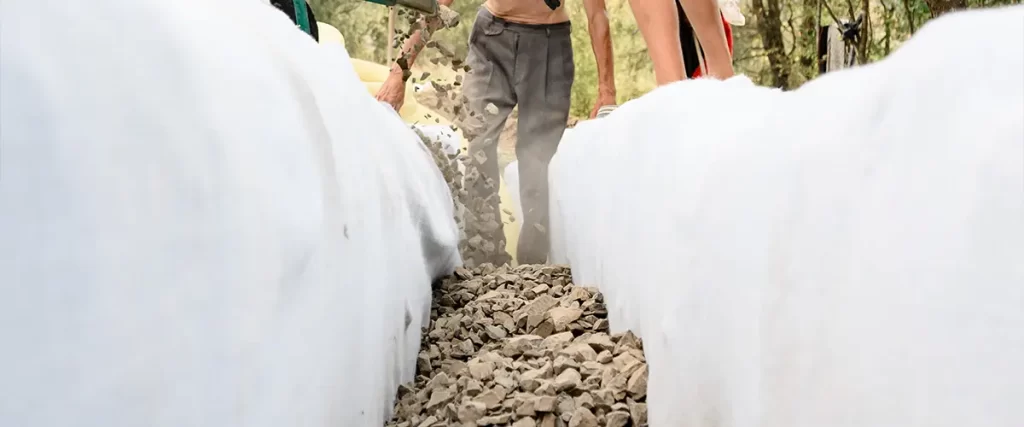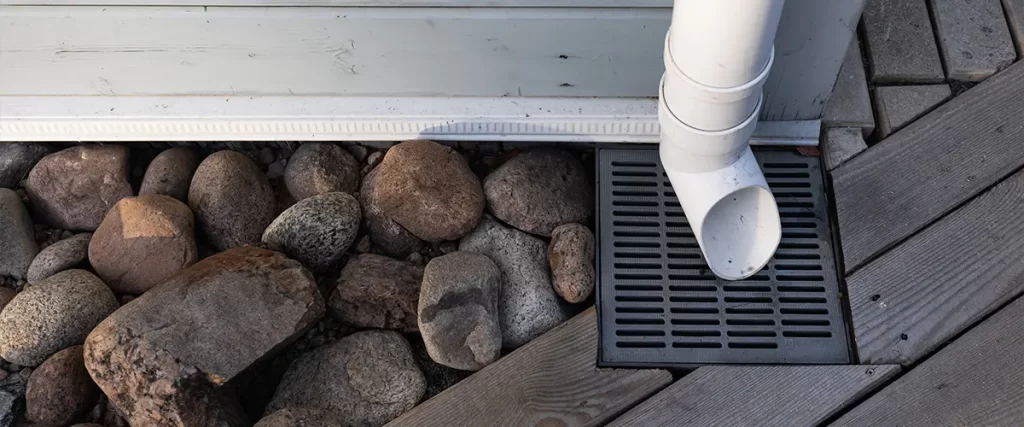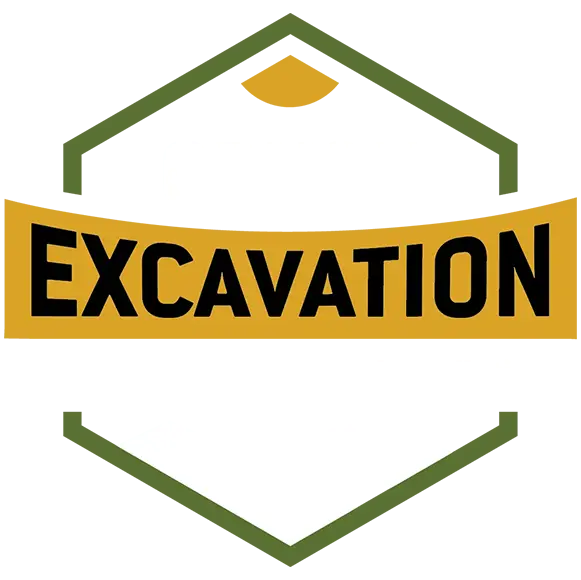Every Aurora homeowner knows how dramatic Colorado’s weather swings can be—sunny spring days can quickly turn into snowy evenings, followed by thawing afternoons. While these fluctuations are part of living in our beautiful state, they can silently wreak havoc on your home’s drainage system, particularly French drains.
If you’ve ever noticed pooling water in your yard or a musty basement after a cold snap, the Colorado freeze-thaw cycle could be at the root of your troubles.
Understanding how Aurora and Denver-area climates specifically affect your French drain is crucial. Let’s explore exactly how the notorious Colorado freeze-thaw cycle impacts your French drain and how to ensure it keeps protecting your home effectively.

How Aurora’s Weather Can Challenge Your French Drain
Colorado’s climate is famously unpredictable—especially around Aurora and the greater Denver metro area. Winters are harsh and dry, punctuated with snowfall that quickly melts under bright sunshine. This repetitive freezing and thawing cycle can cause the soil around your French drain to expand and contract dramatically.
When water freezes, it expands, applying pressure to drainage pipes, gravel beds, and even landscape grading. Over time, these shifts can damage pipes, clog drainage fabric, or even compromise the structural integrity of your entire drainage system. Understanding how Aurora’s specific weather patterns affect your drain is the first step to proactive maintenance.
Freeze-Thaw Cycle Explained Simply
When temperatures drop, moisture in the soil freezes and expands. Think of it like water freezing inside a closed container—it pushes outward, causing cracks or shifts. As the temperature rises, the ice melts, causing soil particles to collapse inward and potentially clogging or damaging your drainage system.
Signs Aurora Homeowners Should Watch For:
- Sudden yard flooding or standing water after snow melts
- Basement dampness or unusual odors
- Visible cracks or shifting soil around drainage areas
- Noticeable changes in landscape grading near drains
How Freeze-Thaw Cycles Affect French Drain Performance
French drains depend on proper water flow through gravel and perforated piping. During freezing weather, the following issues can emerge:
Soil Shifting and Drain Misalignment
The freeze-thaw cycle repeatedly pushes and pulls at your soil. Over several winters, this gradual shifting can misalign pipes, altering their slope and preventing proper water drainage.
Cracked and Damaged Pipes
Even quality piping can weaken under constant soil expansion and contraction. Cracks in drain pipes allow dirt and debris to infiltrate, eventually blocking water flow and leading to drainage failure.
Gravel and Pipe Clogging
Melting snow often carries fine particles and debris into your drain system. Once temperatures drop again, these particles freeze solid inside the pipes, blocking water flow. Come spring thaw, this blockage leads to standing water around your foundation or yard.
Reduced Drainage Capacity
Each freeze-thaw cycle can compact soil and gravel around your drain, significantly reducing the drain’s ability to handle large volumes of water. This means even mild rainstorms or snowmelt can leave your yard soggy or flooded.
Aurora Regulations and Best Practices for French Drains
Did you know Aurora and the wider Denver area have specific regulations regarding drainage and runoff control? Following city guidelines isn’t just essential—it can protect you from costly property damage.
For instance, Aurora city regulations require proper grading to direct runoff away from home foundations. Combining proper grading practices with a well-maintained French drain system is key to safeguarding your home against damage from freeze-thaw cycles.
Signs Your French Drain May Be Compromised
Catching drainage problems early can save you significant time and money. Watch for these red flags around your Aurora home:
- Pooling water after storms or snowmelt.
- Basement dampness or moldy odors.
- Soil erosion around the foundation or yard.
- Uneven or sinking areas near your drain’s path.

Best Practices for Protecting Your French Drain
You don’t have to wait until problems arise. Here are proactive ways Aurora homeowners can safeguard their French drains:
Regular Inspections
Have your drainage system inspected annually, ideally before winter. Professionals can identify potential trouble spots like pipe misalignments or soil compaction.
Strategic Landscaping
In Aurora, planting grass or groundcover plants near your drain can prevent rapid soil erosion. Their roots help stabilize the soil, reducing the impact of freeze-thaw cycles.
Improve Drainage Efficiency
Consider installing geotextile fabric around the drain pipes. This fabric reduces sediment infiltration and protects pipes from clogging.
Proper Grading
Ensure your yard slopes slightly away from your home—Aurora recommends a 6-inch slope for every 10 feet—to enhance your French drain’s performance and protect your foundation.
How Aurora’s Climate Shapes Drainage Solutions
Aurora’s unique climate has shaped local drainage strategies significantly. Contractors familiar with the region emphasize using durable, freeze-resistant materials, deeper trenching, and specialized gravel that resists compaction. Trust local experts who understand Aurora’s challenges—they know exactly how to mitigate risks specific to our area’s weather extremes.
Best Manufacturers of French Drains
French drain manufacturers focus on high-quality materials and innovative designs to ensure effective drainage and long-term durability.
- NDS, Inc.A leading brand offering durable and reliable drainage solutions for residential, commercial, and industrial applications.
- Hydraway: Known for providing advanced drainage systems that combine efficiency, durability, and easy installation.
- RELN: Offers affordable and innovative solutions with a focus on DIY-friendly drainage systems for homeowners.
FAQ: French Drain Questions Aurora Homeowners Ask
How Long Do French Drains Last in Aurora?
Typically, French drains last between 20-30 years in Aurora, provided they are properly installed and maintained. However, frequent freeze-thaw cycles can shorten this lifespan if neglected.
Can I Install a French Drain Myself?
Technically yes, but proper installation requires precise grading and placement of pipes. Given Aurora’s challenging climate, professional installation ensures your drain functions optimally.
Do French Drains Need Maintenance?
Yes. Regular inspections, particularly before winter, can prevent blockages and extend the life of your drain significantly.

Trust Aurora’s Experts to Safeguard Your Home
While Colorado’s weather is beyond your control, protecting your home from its effects doesn’t have to be. Understanding how the freeze-thaw cycle impacts your French drain is the first step toward safeguarding your property and your peace of mind.
If you’re concerned about your drainage system or want to ensure it’s prepared for Aurora’s unpredictable weather, we’re here to help. Reach out today at (720) 507-4076 and let our drainage experts ensure your French drain is ready to protect your home for years to come.
Our team has been providing this service for years, delivering exceptional results through professionalism and expertise. Work with the best to save money!
